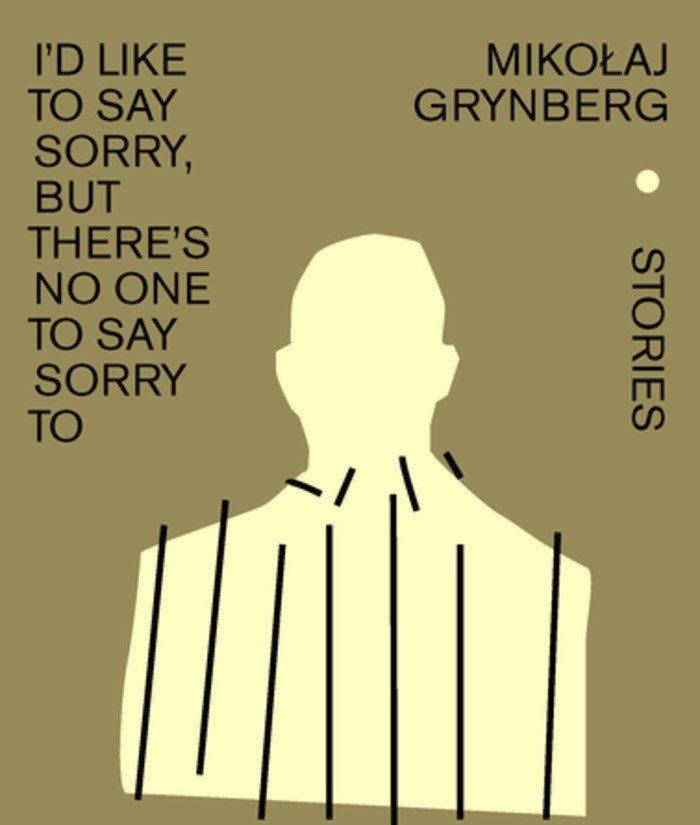I’d Like to Say Sorry, but There’s No One to Say Sorry To by Mikołaj Grynberg, translated by Sean Gasper Bye
First published in Polish in 2017, this is both Mikolaj Grynberg’s first work of fiction, and his first book in English translation. (Polish-language readers may be familiar with the author’s previously published books of interviews with Polish Jews.) The book was shortlisted for the Nike Award, Poland’s top literary prize—and it is not hard to see why.
Written as a collection of 31 first-person short stories, I’d Like to Say Sorry, but There’s No One to Say Sorry To is an exploration of the complicated relationship between Jews and gentiles in modern-day Poland, often impacted by the legacy of the Holocaust.
What emerges is a sense of the complexity of contemporary Polish-Jewish identity. We meet a mixed cast of characters, some of whom disclose hidden or newly discovered Jewish roots, while others admit to past wrongdoings against Jews. Several stories engage with the bewilderment of Jews outside Poland as to why Jews continue to build lives in a land they see as “Europe’s cemetery.”
Grynberg’s writing is sharp, edged with a sarcastic wit and a touch of black humour, yet underlined by an air of tragedy. The Polish title of the book is Rejwach, a Yiddish-derived word meaning a sort of “uproar,” which is an apt way of describing the way each character presses to be heard among the dissonant voices.
Meanwhile, the English-language title alludes to the confessional nature of the stories, as some characters seek to be absolved of their sins against Jews. It derives from the final line of “My Five Jews,” in which a woman acknowledges past antisemitic acts, but pronounces mournfully that there is no longer anyone to whom she can apologize. The title also refers to the book’s look at attempts at reconciliation, both genuine and insincere, showing that deep-rooted rifts are difficult to mend.
I’d Like to Say I’m Sorry is not only insightful, but also an important read.

Primo Levi by Matteo Mastragostino (writer) and Alessandro Ranghiasci (illustrator) translated by Alberto Toscano
The life of the Italian-Jewish chemist-turned-writer and Holocaust survivor, is well known. His memoir If This is a Man (1947) was among the very first Holocaust testimonies to be published, though it did not garner much attention until the release of its second edition some 10 years later.
In this recently released graphic novel—translated into English by Alberto Toscano—Primo Levi’s story is rendered visually with emotional effect.
Originally published in Italian, the book depicts Levi returning to his former elementary school to share his life story with a class of children. Guided by the children’s questions, he recounts his experiences during the Holocaust, as the story weaves between the past and the present.
But this book is not merely biographical. It is also an empathetic examination of Levi’s psyche—the heavy burden he bears to share the truth of what happened at Auschwitz and the trauma he experiences with each retelling.
Matteo Mastragostino’s prose and Alessandro Ranghiasci’s sketch-like illustrations bring a dimension of cinematic quality to the story, mediated through the schoolchildren, in whose eyes we see expressions of horror and sadness. The starkly realistic depictions of Auschwitz throughout the novel force the reader to bear witness.
Interestingly, the German in the text is left untranslated, simulating the linguistic isolation experienced by Italian Jews (for whom German was largely unintelligible) in the Nazi concentration camps. In one particularly powerful panel, a man is shown drowning in a sea of German words.
At a time when the Jewish world grapples with how to maintain the memory of the Holocaust when there are fewer survivors, this book emulates those encounters.

Pollak’s Arm by Hans von Tratha, translated by Elisabeth Lauffer
Originally published in German in 2021, this is a historical-philosophical novel that centres on archaeologist Ludwig Pollak, who is best known for discovering the long-lost arm of the Laocoön group statue (which has been on display in the Vatican’s museum for centuries).
Beyond this achievement, Pollak is a lover of art, an expert on Goethe—and, above all, a Jew to his core.
On the eve of the deportation of Rome’s Jews in October 1943, “K.” is dispatched to Pollak’s home to convince him and his family to take refuge in Vatican City. Yet he quickly finds that Pollak is in no rush to flee, and becomes captivated with the story of his life. In this gripping novel, German writer Hans von Tratha brings alive a man who, in many ways, has fallen into the shadows of public memory.
Through the main character, the novel meditates on the ease with which civilization and humanity give way to barbarism, and the value of art and stories when nothing else remains. The voice Von Tratha employs for Ludwig Pollak draws on the writing styles of other notable German-Jewish thinkers, readers familiar with the works of Walter Benjamin will see parallels with Pollak’s philosophizing on collecting and collectors.
A deeply tragic irony that underpins the novel is the symbolism of Rome itself as both the centre of a great civilization, and as a setting for the savagery of the Holocaust. And while we hope Pollak will leave with K., we know this will not happen — Pollak was later murdered in Auschwitz.
Pollak’s Arm is a thought-provoking, though intense, reading experience. Much like a particularly striking work of art, it will leave an imprint on you long after the close of its final pages.
Hannah Srour is a member of the Association for Jewish Libraries’ (AJL) Jewish Fiction Award Committee and sits on the executive board of AJL-Canada. She can be reached at [email protected] or on Twitter at @srour_hannah.
